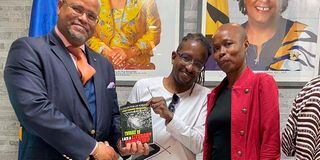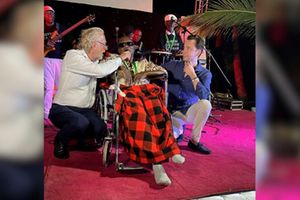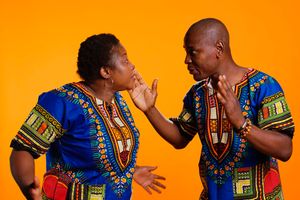
Barbados Ambassador to Kenya William McDonald, cultural attaché Harriette (right) and writer Tony Mochama, who were part of the AMKA and Goethe group that attended literary visit at Langata Women's Prison.
In the classic Fyodor Dostoyevsky novel, ‘Crime and Punishment,’ there is the immortal line “the darker the night – the brighter the stars; the deeper the grief – the closer is God,” and nowhere is this hope, when one is at the end of one’s rope, necessary as when in prison.
Not long ago, we had gone to prison to serve our sentences to the ‘clients’ (as they respectfully refer to the inmates) of Langata Women’s Prison, as writers of the AMKA Creative Writing Space that meets every last Saturday of the month at the Goethe Institut.
Having passed by Langata Cemetery en route there, Dr Tom Odhiambo, literature lecturer at the University of Nairobi, quoted some forgotten author about prison walls being “where you realise that freedom is the most precious thing in life,” and the cemetery where you realise that “the ground that is your floor today, will someday be your roof forever …”
Fortunately, these gloomy reflections by the don were, ironically, dispelled by the sunny disposition of the (often younger) clients in Langata Women’s prison.
And it wasn’t just AMKA writers like Peter Ngila (The Legend of Beach House) there, as well as Goethe’s director Cristina Nord, Arts’ Program officer Lily Moraa, librarian Zahara Kasperidus and journalists Hans (German) and Fritz (Swede).
The Barbados High Commission was also there, HE William McDonald and spouse, Cultural attach’e Harriette and poet Winston Farrel.
Oh, and what words these chosen fifteen studying clients of Langata Women had for us in their social hall, just opposite a neat library building and adjacent to the computer room; all of them polite and well-groomed, hopeful and passionate.
So much so that it was impossible, through their words, not to build a bond.
Ruth Kamande, a life remandee (after the stabbing death of her boyfriend ten Septembers ago in Buru Buru) cuts both a contrite character and rehabilitated, responsible figure, and some kind of creative mentor with her patriotic poems – devoid of personal content, perhaps as a way of deviance avoidance like Fyodor’s Raskalnikov in the aforementioned “Crime and Punishment.”
An inmate we’ll just call Emmy C took us into her interior world behind those bolted gates with a moving poem called “The Weight of Walls,” every line in the poem taking one into the excruciatingly slow tick of the clock when in prison.
Every stanza the weight of time of endless days, followed by even longer nights.
“I have written twenty long poems since I became a client here in 2016,” Emmy C told me later. “But I want to get to a hundred, and publish a prison poetry book.”
I did the Math in my head, and said: “But Emmy, 2056?”
“I have all the time,” she punned, before we agreed to a daily poem; and a 100 poem manuscript on my next visit on X-Mas Day.
A Nigerian creative firebrand called Ada, in her sixth year of a 15 year sentence (for drug trafficking) had a cathartic poem called the ‘Sound of Wings’ that poignantly recalled her days as an air-stewardess; but also the way elemental things like the sound of wind makes you think of the ‘outside world,’ a breeze through jacaranda trees, friends she may never see again in this lifetime, what her home looked like, the cancerous growth in her mom’s chest that required millions, (and no socio-medical system in oil-rich Nigeria) that led her down this path of perdition.
“In prison we leave with a lot of regrets,” says middle-aged Waithera, who has a story called “The Price of Vice,” her own moral crime being avarice that led her into defrauding the company she worked for, yet “I had a car and a good salary, but comparing myself (to) with bad friends misled me (sic) into wanting more.”
Waithera, in her stories, warns against the vice of greed, like grabbing property.
But that is for wananchi, as we have seen in recent days with the DP’s cases.
‘Wenyenchi’ (shareholders of Kenya) are more like Aristov Svidrigailov in Dostoyevsky’s brilliant ‘The House of the Dead,’ the corrupt aristocrat described as “the most revolting example of the degree to which a man can lower himself to base appetite; the degree he can kill all moral feeling in himself, without moral or remorse, a kind of lump of meat, a beast with teeth and an insatiable stomach …”
When you think of any local politician who can take a tender for Shs 3.5 billion worth of mosquito nets, meant to protect small children against malaria, then provide useless ones (to ‘eat’ the children), then this is the picture of our politicians, unrestrained by any inner norms, unafraid of our outer set of Laws.
Yet, as we drank tea and samosas outside the social hall, mingling with the clients, we would meet one like 26-year-old Virginia*, very eloquent and well-spoken, who went from Moi Girls to Moi University, but her single mom passed away, and she had to take care of her younger sister.
“So, I got into a defraud-and-extort sophisticated network run by foreigners in Kenya,” Virginia says, “and when it was busted they bribed the “investigators” and I took the fall for the entire cartel and got a four year sentence, even as a first offender.”
“Some of those bad-tempered middle-aged magistrates can be very unforgiving towards young beaus,” quips poet Dixon to the reigning Miss Langata queen.
Virginia laughs. She will be out in less than a year, and Lydia Gaitirira, a retired university administrator and founder of AMKA, will have her as a guest writer at the Goethe next September.
Virginia’s case makes one think of the Marmeladov household in Fyodor Dostoyevsky’s ‘The Drunkards,’ with its alcoholic father, consumptive mother and ultimately orphaned children, and Sonya, the tart from a broken, destroyed home, who has yet not abandoned her faith; her ‘criminality’ forced upon her by the demands of an unjust society, where her ‘innocence’ is that of “child, mother, angel and holy fool …”
Virginia’s kid sister, now 24, took up with one of the swindling foreigners once she was in prison; and this sibling she loved with all her heart (or any other friend, or relative) has never bothered to visit.
“The characters I create in my stories are my companions.”
‘Tisa’ Tasi, the kindly warden we met, encourages her ‘girls’ both in their school studies and their arts’ workshops.
An older client, Naliaka, narrated how, when she first came to Langata Women’s, “I would dream at night, scream, then disturb my sisters with hymns all night …”
The caring warden got her lots of pen and paper to “write down her dreams” and Naliaka* says “sasa hizo shetani zote zilipotea.”
Of course there is always the unrepentant crook.
One inmate I will call Stacy plagiarized a “Basket Mouth” performance piece, and took the applause, especially from poet Scola Moraa, but one doesn’t call out a person who has to answer to ‘roll call.’
All in all, as Ms Nord later said, it was the ‘most amazing literary experience, ever.’
And Muthoni Gichuru, AMKA moderator, “AMKA people didn’t wish to leave prison.”
Will it be transformative?
Poet-and-playwright Adipo Sidang (Parliament of Owls) reminded me of the story of Saga McOdongo (Judith Akinyi), polytechnic lecturer, an alumni of Langata WP: Jailed for eleven years in 2001 for trafficking drugs from India, she squeezed in the time to write ‘Deadly Money Maker,’ got earlier release in 2007, was re-arrested in Rome in 2010 with coke pellets in her stomach (she was unconscious), got eight years, and was released in four years. Will there be a sequel to her story?
“When I was in prison,” said Mike Tyson, “I was wrapped up in all these deep books. That Tolstoy crap? – people shouldn’t read that stuff.”
Tony Mochama is a winner of the Jomo Kenyatta Literary Prize, 2024. He is also an instructor of the AMKA Writing Space. [email protected]






